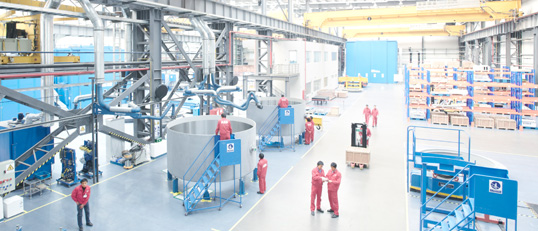(includes GRI indicators EC8, SO1 and EC9)
ABB works in a wide variety of ways to strengthen environmental, social and economic development in the communities where we operate.
From supporting schools in Brazil, India and South Africa, to charity fund-raisers in the United States and Canada, or helping disabled athletes at European Special Olympics, to an anti-desertification program in China, employees like to volunteer for worthwhile projects.
ABB’s community engagement focuses on two core areas: Education and health care. In total, ABB employees and companies donated approximately $7.5 million in funding and provided 2,200 man-days in volunteering time in 2010.
For ABB, community engagement goes beyond philanthropy. The company seeks to be welcome in the communities close to our operations, which is essential to a social license to operate and good for our business. Support for education projects not only raises standards but in some cases helps ABB to recruit qualified engineers and other staff.
We support schools, students and universities in different ways. There are schemes in countries such as Brazil, Colombia, India, Poland and South Africa to help schools in disadvantaged areas. In India, for example, we support six government schools close to our plants, building infrastructure and contributing to a scheme to provide a midday meal to the children.
There is clear business value in some of the programs. In Finland, for example, the company contributed $1.4 million to four universities in 2010 as a way of ensuring that engineering graduates have the qualities required by industry. In Saudi Arabia, ABB holds annual training programs for students from vocational institutes and offers technical training to engineering students.
In other countries, such as China, needy engineering students receive financial support, while in Argentina, Egypt and Turkey the company has donated technology to university laboratories. This is also clearly a means of raising the company’s profile among potential recruits.
At a corporate level, the ABB Jürgen Dormann Foundation for Engineering Education, extended its scope in 2010 to new countries to help electrical engineering students in need of financial support. Students from Brazil, Egypt and Vietnam have joined colleagues already on the program in India, China, Egypt, Mexico and Poland. A highly successful first international meeting of students, which brought together some 30 scholars for a week of learning and exchange, was held in Switzerland in August 2010.
While there is no guarantee to students sponsored by the foundation of future employment at ABB, their progress is carefully monitored by ABB mentors. One of the first graduates – at AGH University of Science and Technology in Krakow, Poland – has already been given a part-time job at our corporate research center in the city.
Aside from education, ABB is involved in a range of community projects, many of them centering on healthcare. Employees in Canada and the United States raised more than $1 million in 2010 through donations and charity events with much of the funds being distributed to hospitals and healthcare organizations. In South Africa, we support a project to help orphans of HIV/AIDS victims; in Egypt, the company provided the technology to air-condition a leading pediatric hospital in Cairo; and in the United Kingdom fund-raising efforts are focused on a cancer care charity.
Our volunteers also help people with intellectual disabilities at Special Olympics events in Germany, Italy, the United Kingdom and the United States. In Germany, for example, 150 employees took a week out of their holidays to support athletes at the Special Olympics in Bremen in June 2010, describing it as a very rewarding experience.
The nature of community support varies considerably. The company’s largest financial contribution in China in 2010 went towards the reconstruction of a school destroyed in a devastating earthquake in 2008. Among the community initiatives in Brazil, left-over food from canteens at factories on the outskirts of Sao Paulo is delivered to a soup kitchen in an underprivileged area, providing 600 meals a day.
In some countries, volunteering efforts focus on ways of improving the environment. In China, for example, ABB is involved in tree-planting efforts as part of an anti-desertification project, and in the United Arab Emirates, volunteers work on several environmental projects, including recycling and tree-planting programs.
We also continued our corporate sponsorship agreements with a number of international organizations, including the Swiss-based International Committee of the Red Cross and the WWF. Three new projects were launched with the WWF – supporting access to electricity in remote areas of India and South Africa, and an energy-efficiency training program in China.
ABB’s common efforts focus on our “Access to Electricity” rural electrification program in India and Tanzania which is strengthening the economic, social and environmental development of people in remote communities.
In Tanzania, ABB has partnered with local authorities and WWF to provide electricity to a village in the south of the country. The benefits of increased access to electricity have been marked and measurable. They include more schooling after dark, the health clinic being able to treat patients for more hours a day, and the start of new businesses such as an electric sawmill and an oilseed press which are raising incomes and supporting better environmental management. The size of the village has grown by 30 percent since the project began in 2004 – an issue that has also been carefully planned and managed.
In the Indian state of Rajasthan, ABB has partnered with an NGO and state authorities to bring distributed solar power to a widespread desert community. Some 8,000 people are benefiting from increased earnings because of the ability to work after dark, increased access to healthcare and more schooling. Tailors and weavers, for example, are earning up to 50 percent more because they can work at night, and the number of children attending school has doubled.
ABB produced a film highlighting the challenges and achievements of the two projects in 2010.
